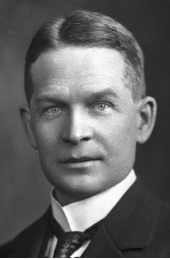Frederick Soddy
The English chemist and physicist Frederick Soddy, born on September 2, 1877, was awarded the Nobel Prize in Chemistry in 1921 for his research on radioactive substances and the nature of isotopes.
During his work with Ernest Rutherford, also known as the "father of nuclear physics," Soddy discovered that radioactivity is a process in which unstable atomic nuclei transform into more stable nuclei, releasing energy in the form of radiation.
This work was closely linked to his pioneering research on isotopes, through which he demonstrated that isotopes are atoms that possess the same chemical properties but differ in atomic mass.
This fundamental knowledge has had wide-ranging applications, from nuclear medicine and radiotherapy to radioactive dating and environmental monitoring of radioactive materials. The understanding of radioactivity and isotopes, as established by Soddy, remains essential in modern nuclear science.
